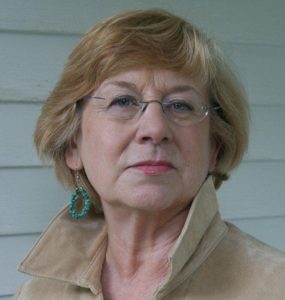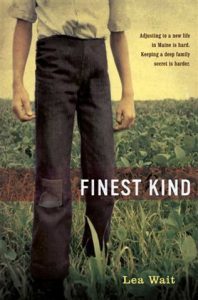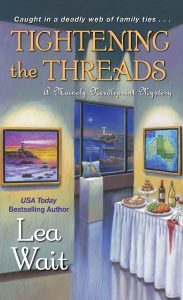“What Am I Really Writing About?”
 Lea Wait, here, thinking about personal passions and interests and how they can become themes, in life and in writing.
Lea Wait, here, thinking about personal passions and interests and how they can become themes, in life and in writing.
As a child I was fascinated by books (often set in the nineteenth century) about orphans who found caring homes. As an adult in my mid-twenties I volunteered with abused children in New York City. When I was thirty I adopted my first daughter.
When I was in my mid-forties, the single adoptive parent of four daughters, caring for my mother and working for a large corporation, a major publisher contacted me and asked me to write an autobiography about being single and adopting older children.
I’d been writing for adoption publications. I’d spoken at adoption conferences as an adoption advocate. I’d counseled prospective parents (both single and married) about adopting older children.
But when that publisher called, I did some hard thinking. My four daughters were teenagers then, all coping with major (different) issues. As a family we were going through difficult days. As a parent, I was struggling, too. I was clinically depressed and trying to find the strength to guide my children through their struggles while I was also challenged by a changing workplace and my mother’s illnesses.
But I believed we’d all survive. My girls would become strong and capable and productive adults, and I would go on to the next phase of my life.
Much as I was thrilled to be offered the opportunity to write a book, I didn’t want a memoir of those difficult days to be published, and perhaps to haunt the healthy futures of my daughters.
I not only turned down the publisher, I stopped writing and talking about adoption, and started writing fiction.
Fiction was different. It wasn’t my life.
I could write about anything. Anything but adoption.
I’d always loved historical fiction. I was fascinated by the past, and how ordinary people had lived then. I believed everyone had secrets, large and small, and that, more often than they knew, those secrets changed their lives.
In time, my children found their own ways, as I had hoped — had believed — they would.
I wrote mysteries for adults and historical fiction for young people.
About five years after my first book was published, a manuscript I’d been working on for more than a year was rejected, sight unseen, by my publisher. They’d decided they didn’t want a book on that topic. My editor asked me to come up with another book to meet my deadline. I was crushed by the loss of a book I’d loved, and, although I tried, couldn’t come up with another subject I wanted to write about.
Finally, after several months, I had lunch with my editor and told her how frustrated I was. None of my ideas were coming together. I was lost, and afraid. Nothing was working.
My editor was calm and understanding. “Well,” she said, “all your books are about a quest for home. Sometimes that means family, sometimes it means place, or purpose. But all of your characters are searching for a place they can be loved and accepted for themselves.”
I was stunned. I hadn’t realized that. And yet, thinking of what I’d written, my editor was right.
The book I wrote after that lunch was Finest Kind, set in 1838, about a family that has a secret that changes the way they interact with their community. My major character, thirteen-year-old Jake, also discovers that other families have secrets, too.
Since then I’ve written books for both adults and children. My nineteenth book was just published (a mystery, Tightening the Threads,) about a character whose whole life and family have been a secret, until now.
I don’t always think about quests for family and secrets when I’m starting to write a book. But my characters and plot always seem to lead me in those directions. And now I’m more conscious of that happening, and I’ve accepted that it’s all right. Searching for family and home and helping others to do the same has been a theme of my life. It’s not strange that it’s now a theme in my writing.
In my books, that search seldom involves adoption directly, although in my Shadows Antique Print series my protagonist, Maggie Summer, did adopt an older child. (In Shadows on a Morning in Maine.)
I’m writing the beginning of a new series, now. The two protagonists are sisters who have just met for the first time. They have very different background and goals. And yet, they are both my characters. They find part of themselves in each other. They become family.
I hadn’t thought of that when I imagined the series. But I’m not surprised by it.
I suspect that most authors have similar experiences, consciously or unconsciously. That the same themes run through their work. Readers, too, seek out books that reflect the themes of their aspirations, or their lives.
Is that true for you?



